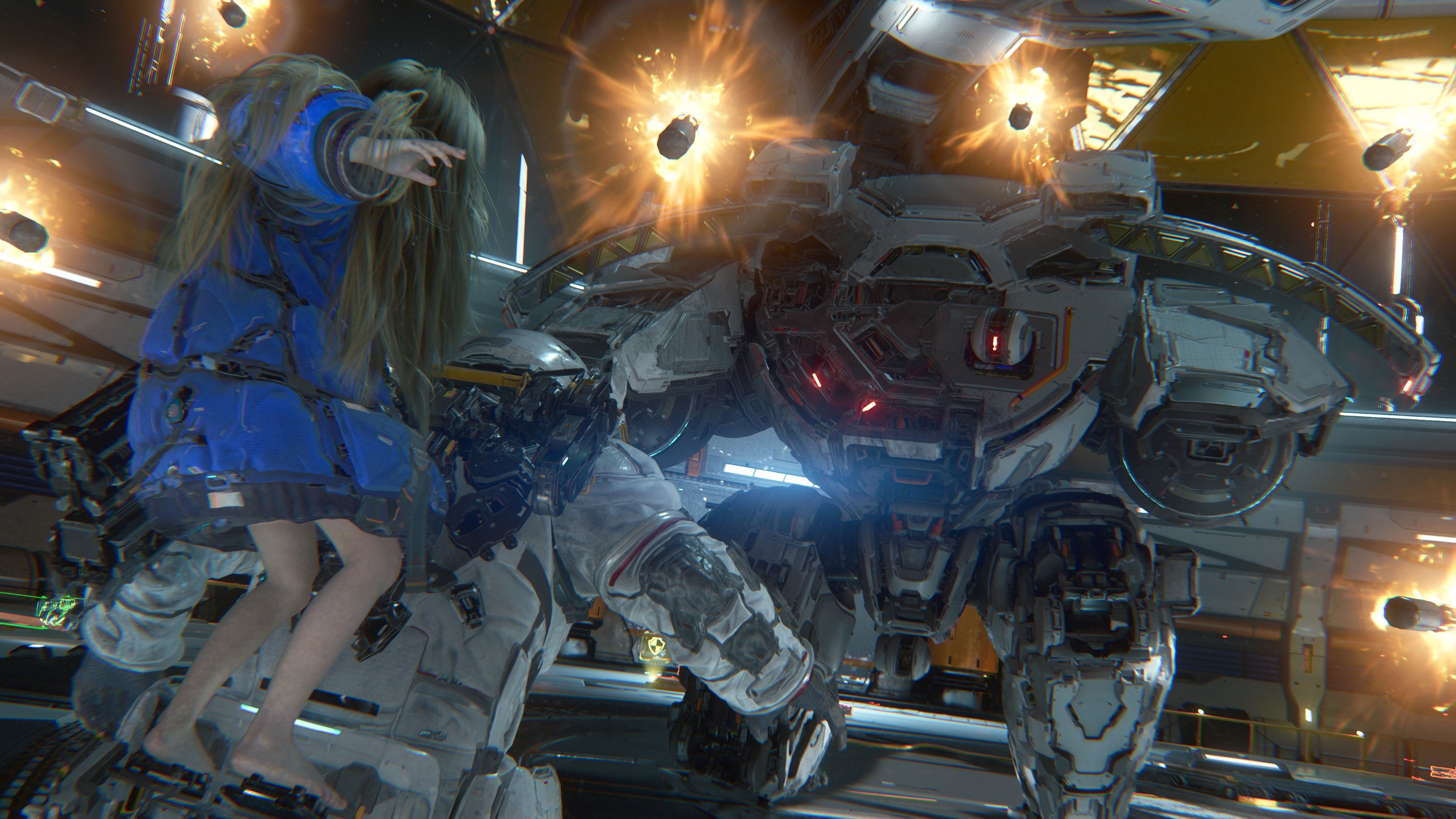Capcom already has a packed 2026, with at least three major sequels — Resident Evil Requiem, Onimusha: Way of the Sword, and Monster Hunter Stories 3 — set to overshadow its long-in-development Pragmata, something brand-new from the company. But fans of action games should keep a close eye on Capcom’s sci-fi shooter, which brings some intriguing twists to the third-person shooter formula.
Polygon played Pragmata earlier this summer, and executive editor Matt Patches already delivered a glowing preview of the game. He called Pragmata “a blast” (accurate) and said its “fluid, frictionless demo offered a combat-forward third-person shooter experience that felt totally fresh.” I got to play a slightly extended version of that demo, which Capcom is showing at Gamescom this week, and while it all but confirmed Pragmata was definitely not a secret Mega Man game, it certainly left me wanting more.
As previously noted, the dual protagonist team of spaceman Hugh Williams and little girl android Diana combine their powers to make every encounter in Pragmata part puzzle, part shooter. There’s a lot of quick thinking on the fly, not just careful aiming and enemy management, as the two explore the space station known as the Cradle, where robots gone haywire run amok. While Hugh has an arsenal of guns at his disposal, he relies on Diana to hack their enemies to make them sufficiently vulnerable to attack.
Each encounter involves some combination of Diana’s (pretty fun) hacking minigame and switching to the best firearm in Hugh’s inventory. In addition to a standard rifle that slowly recharges its ammunition, Hugh can also utilize a Shockwave Gun that acts like a futuristic shotgun for close-range destruction and a Stasis Net that hinders movement. Basically, an encounter with multiple enemy bots might involve hacking one, stasising another, going ham on the hacked one at close range, taking a breath, and moving on to your next target. Rinse and repeat.
Where Pragmata’s combat encounters get more interesting are in the limitations of Hugh’s weapons and in power-ups for Diana’s hacking minigame. Most of Hugh’s guns have very limited ammo, and while some of that can slowly recharge, players may want to intentionally deplete a gun’s ammo — causing it to self-destruct — and grab another fully loaded one. As someone who identifies as a chronic reloader (fire one shot, reload, repeat) in games, the idea of carefully managing ammo stocks and basically throwing away a spent weapon took some getting used to. But it was also very fun, strategically speaking.
Diana’s hacking minigame is simple, but under pressure, it can feel daunting. You’re kind of playing a high-speed game of Snake, moving a line through a grid called the Hacking Matrix: crossing over blue squares, avoiding red squares, and ultimately landing on the green square. Hugh can also find consumable power-ups called Hack Nodes for Diana’s hacking puzzles, adding yellow squares that amp up the strength of her hacks. Again, these need to be strategically used; during a boss battle, I regretted squandering my Hack Nodes in a fight leading up to the boss.
Diana’s hacking prowess has another layer. As a gauge fills up during battles, Diana can engage the Overdrive Protocol, giving her the ability to simultaneously hack multiple enemies, forcibly opening up their armor and temporarily halting their movement. Again, saving this super move for the right moment appears crucial to surviving certain battles.
The Pragmata demo that I played culminated in a boss fight against the massive security bot known as SectorGuard. As it approached, I still had a shred of suspicion that Pragmata had Mega Man DNA, but when SectorGuard was introduced and looked nothing like the Yellow Devil, I resigned myself to the truth. Pragmata is its own thing. (Good!)
The battle against SectorGuard forced me to use every aspect of Hugh and Diana’s toolkit. After using Hugh’s boosters to dodge SectorGuard’s charge toward us, I had Diana hack the machine, then put it into a stasis bubble, and unloaded multiple Shockwave blasts into its dorsal weak spot. I churned through multiple guns as I depleted them of their ammo, sprinted around the battle zone to find power-ups and fully loaded guns, then repeated my hack-shoot-hack-shoot pattern to (just barely) take SectorGuard down.
There’s always the chance that Pragmata’s combination of hacking puzzles and third-person shooting is something like the Pepsi challenge: best in small doses, cloying in the long run. But Pragmata’s shooting and the gameplay facets that surround it are incredibly fun at first blush. It’s certainly shot to the top of my list of most anticipated games coming next year, and I think it should be on yours too.
Pragmata is coming to PlayStation 5, Windows PC, and Xbox Series X sometime in 2026.













